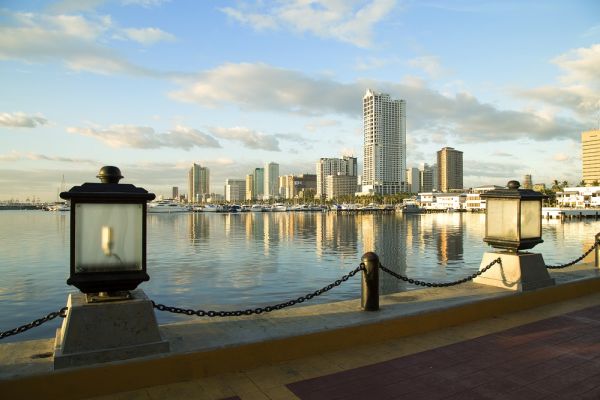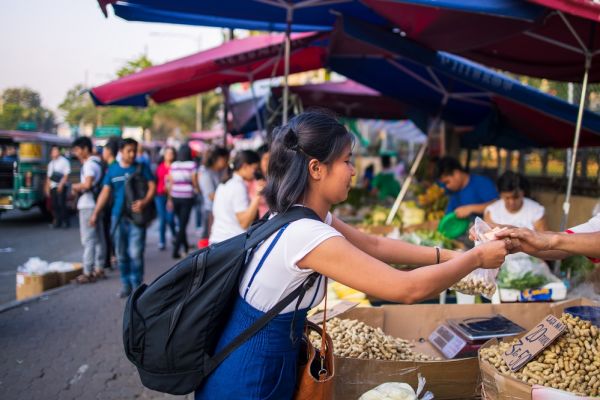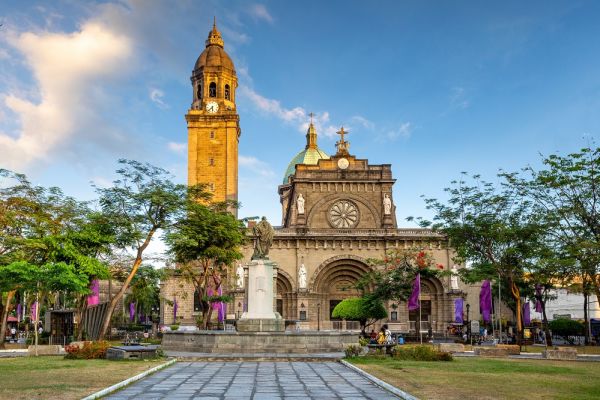ManilaTravel Guide
Whether you’re artsy, a history buff or a foodie, the capital city of the Philippines, Manila, has all these elements and more. Becoming increasingly popular with tourists, Manila is a melting pot of cultures, with plenty of Spanish and Chinese influences, making it a lively destination to explore and taste your way through.
Known for its nightlife, contemporary art scene and museums, Manila is also home to the oldest Chinatown in the world. Shopaholics will be in their element with many American-style malls and markets to browse through, while green spaces in the city offer loads of activities and fun for all ages.
Ready to find out what to do, where to stay and how to make the most of your holiday? Our Manila travel guide has got you covered. Let’s get started…
Manila quick facts
Language
National language
Tagalog
Beverages
Bottle of Coke/Pepsi (330ml)
NZD $1.48
Local time
Wednesday
4:00pm
Currency
Philippine peso
NZD $1.00 = PHP ₱33.51
Eating out
Restaurant meal (casual dining)
NZD $8.95
Electricity
Plug type: A
2 or 3 pins • 220V
Explore Manila
Where to stay in Manila?
Wondering where to stay in Manila to maximise your experience? Well, it depends on the kind of holiday you have in mind. Each neighbourhood also has its own Manila vibe to offer.
It doesn’t get trendier and more exciting than Quezon City, northeast of the city centre. This area is for you if you’re keen on shopping at boutiques, being part of the energetic nightlife and hanging out at popular cafés and restaurants. The University Hotel at the University of the Philippines Diliman is ideal for young backpackers and is surprisingly welcoming and cosy, while the Seda Vertis North is the ultimate luxury hotel with all the frills!
Staying inside the little walled city of Intramuros is an experience to brag about! Just be sure to book your accommodation well in advance, as the providers are limited. White Knight Hotel Intramuros is a good choice if you’d like something simple, affordable and conveniently located. It’s right in the middle of Intramuros for easy access to all the best sights. If you’d prefer something more lavish, set your sights on The Bayleaf Intramuros, a four-star hotel offering fancy rooftop dining. It’s won numerous TravelAdvisor Travellers’ Choice Awards over the years.
First-timers flock to Makati because it’s one of the neighbourhoods packed with exciting things to do in Manila. It offers accommodation options to suit most budgets. Two good choices are The Peninsula Manila, a five-star hotel with plush suites and a world-class onsite spa, and the charming Park Avenue Guesthouse 2443, a 1920s Spanish-style residence that is all about home comforts and a quiet stay despite the busy-ness of Makati.
Believe us when we say, this is just the start. Book your Manila accommodation today!
Things to do in Manila
Like any capital city, Manila is busy, loud and vibrant, but the locals are friendly, the culture is fascinating, and we guarantee you’ll never be bored! Manila has a lot to offer every kind of traveller, with some saying it’s one of the coolest cities in Asia. Here’s a snapshot of things to do during your visit.
Cobblestone streets, horse-drawn carriages and some of Manila’s top tourist attractions – that’s what you’ll find in the little walled city of Intramuros. It’s home to the oldest church in the Philippines, San Agustin Church, built in 1571, which is known for its ornate interior and stunning ceiling frescoes. Fort Santiago can also be found in Intramuros, a citadel of great historical significance built by the Spaniards. The three-level Casa Manila is another essential stop-off for history buffs. It’s a living museum depicting the lifestyles of wealthy merchants during the Spanish colonial era, including period furniture and a stable in which the carriages were parked.
Binondo is Manila’s Chinatown and an unmissable attraction. The oldest Chinatown in the world, it was established for Chinese immigrants way back in 1594 – find it across the river from Intramuros. A hub for authentic Chinese restaurants, trinkets and the ultimate place to shop for bargains, it’s well worth spending a day immersing yourself in Chinese culture and history here.
The Manila Bay harbour features a 2km promenade or bay walk along Roxas Boulevard, and this is the best way to watch the sun setting over the water. Afterwards, pop into one of the many bars, cafés or restaurants for a drink or a meal, followed by clubbing until dawn.
Rizal Park, also known as Luneta Park, is one of the biggest urban parks in the Philippines. It’s also a historical hotspot where political activist and national hero José Rizal was executed by the Spanish colonial authorities, and the Rizal Monument honours his memory. The park is a beautiful green space in which to picnic, jog or stroll down the paved pathways. There are also ponds and wooded areas. After sunset, enjoy the colourful displays of the dancing musical fountain at the Central Lagoon.
The Manila Ocean Park oceanarium is ideal for a fun day out and a must for families travelling to Manila with kids. In addition to the fascinating marine creatures, the ocean park is also home to other attractions, such as the ball pit and the World of Creepy Crawlies. For the adults, there are plenty of options for shopping, dining and relaxing (get pampered at the Zenyu Eco Spa while the kids have a good time).
Contemporary art is big in Manila; there are many galleries, art spaces, design shops and museums throughout the city. Street art is also big, with graffiti and murals almost everywhere you look, adding even more colour to vibrant Manila. It’s becoming a recognised art form, with some formalisation taking place through the Urban Artscape Project and street-art collectives.
Looking for an immersive experience? Then a Manila tour is the way to go.
Flights to Manila
Manila food and drink
Filipino food ranges from simple and wholesome to complex and exciting, usually with a combination of three flavours: salty, sweet and sour. Looking for an unforgettable fine-dining experience? Check. Keen on casual dining? Check. Prefer to sample street food? Check. As you can see, the choice is all yours…
There are many fine-dining restaurants in Manila but one that seems to appear on every “best restaurants list” is Spiral at the Sofitel Philippine Plaza. The restaurant is celebrated for its buffet spreads and classy look and feel. The dining experience is unique, with 21 ateliers to choose from, each featuring different cuisine from around the world.
Cafe Ilang-Ilang is another highly recommended restaurant with a similar vibe to Spiral. It also specialises in gourmet buffets and boasts live cooking stations, allowing diners to watch the dishes being prepared.
All over the city, you’ll find vendors serving tasty street food – Spanish saucy barbecue pork and tacos, Filipino food and Chinese nibbles. This is always the best way to get acquainted with local fare – sample your way through Manila! Speaking of Chinese street food, Eng Bee Tin Chinese Deli in Binondo is one not to miss, famous for its mooncakes (pastry with a sweet filling).
Vegan travellers, take note! There’s a great little spot just for you in Makati called Green Bar. Dishing up all-day breakfasts and baked goodies, happy hour here is also not to be missed. Rodic’s Diner in Quezon City is another laid-back eatery, featuring the unique Filipino breakfast dish tapsilog comprising cured beef, fried garlic rice and fried egg.
Get a real taste for the local cuisine by booking a Manila tour.
Manila through your eyes
Where to shop in Manila?
While much of your holiday in Manila will be spent sightseeing and sampling delicious food, you probably won’t want to leave without indulging in at least one shopping spree!
Manila boasts many American-style shopping malls, but among the most popular is Robinsons Manila, which has seven levels and more than 1,000 shops, outlets and restaurants for fine dining. The mall is primarily known for the mammoth Robinsons Department Store and Robinsons Movieworld.
The mixed-use estate of Bonifacio Global City has to be an all-day visit as there are countless things to do here from shopping to attending pop-up events, bazaars and live music concerts.
168 Shopping Mall is another favourite, nestled in Binondo. It spans three levels and is often surrounded by vendors and street stalls, balancing Western and traditional Eastern shopping experiences.
If you enjoy markets more than malls, you’ll be happy to know there’s a market for everything in Manila: flowers, fish, souvenirs and more. Quiapo Market is a winner, operating on Palma Street in Quiapo, with its fun atmosphere and loads of friendly vendors selling various goods, from exotic fruit and veggies to handicrafts and keepsakes. Salcedo Market is another go-to – especially for food.
Looking for a safe and simple way to bring your money when you travel? Our Travel Money Card has you covered!
When is the best time to travel to Manila?
The beginning of the year from January to April is the best time to travel in Manila. It’s the dry season making it ideal for exploring. Hot and sunny with temperatures around 32°C (89.6°F), always make sure you have a hat and water bottle and that you’ve slapped on some sunscreen, before you go sightseeing. Two months on either side of the dry season are not recommended – May is way too hot and December is way too humid!
If you’re on a budget, you might want to consider visiting Manila during the wet season, extending from June to November, when prices for travel and accommodation are lower. But be prepared for lots of rain, strong wind and extreme humidity! You’ll probably still be able to enjoy the city at this time of year and experience some of the must-sees and must-dos, especially since temperatures rarely dip below 30°C (86°F).
Don't miss out. Book your Manila flight today!
How to get around Manila
Getting around in Manila is both easy and affordable. The most popular form of public transport in the Philippines are the Jeepneys, and these colourful open-air vehicles, operating as a kind of a minibus, have become synonymous with Filipino culture.
Other forms of public transport are buses and there are three separate monorails in operation – the Manila Metro Rail Transit (MRT), the Light Rail Transit (LRT) − both connecting Manila’s north and south areas − and the Manila Metro Rail Transit System (MRTS), which is the go-to if you plan on exploring Quezon City or Makati.
You can also opt to breeze along the busy city streets on a motorised tricycle – another fun form of transport in Manila. They vary in size, and some can accommodate up to four passengers. And then there are the unique bamboo bikes to hire or, if you prefer, you can choose a guided tour.
Taxis are available throughout the city and are a good option during crazy rush hour. It’s also possible to book a car or a motorcycle ride using the Grab or Angkas apps, respectively. The latter is only appropriate if you’re travelling solo and if you’re feeling brave!
Let us help you organise your own wheels for exploring. Hire a car in Manila today!










